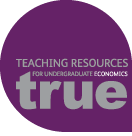TRUE: Development Economics – IPR matters
Contributors’ rights
Adapted from a page by Vince Daly (TRUE Econometrics wiki)
“Intellectual property is generated through intellectual or creative activity….Like all property, you can lease it, license it, give it away or sell it.”
Great Britain. Intellectual Property Office (2009) Intellectual Property Explained. [Online]. Available at: http://www.ipo.gov.uk/myip.pdf (Accessed: 2-Oct-09).
“Copyright” protects the rights of whoever expresses an idea. Copyright protects the expression, not the idea itself, and exists automatically once the expression of the idea becomes fixed, for example by writing it down. A written description of a way of teaching an aspect of development economics thus automatically has copyright, so too does a representation of the state of knowledge regarding some aspect of development economics, for example, a set of PowerPoint slides on the topic.
Placing a dated copy of the work in a reputable repository, for example as part of the TRUE wiki, helps to clarify who holds copyright. You can use © followed by your name and the date to indicate when an item was created and by whom.
Copyright, being an example of Intellectual Property, can be disposed of. Its owner has the right, for example, to license it. Contributors to the TRUE wiki are encouraged to license their contributions as Creative Commons/ Attribution /Non-commercial. Anyone using your contribution is then obliged to acknowledge you as the source and may not use your work for commercial purposes. Licensing simply requires that you place a licensing statement within the contributed item and that this includes a link to a more complete description of the licensing terms.
|
Example of a licensing statement:
© Peter Smith, October 27, 2009
This work is licenced under a Creative Commons Licence
|
Further information on why and how to license contributed materials is available in the Economics Network advice sheet for content authors.
Contributors’ obligations
You should be careful not to claim copyright where it actually belongs to someone else. For example, lecture notes might include a diagram copied from (say) a textbook website or an extract from a journal article and in such cases copyright should be acknowledged.
You might be employed at a University where the contract of employment includes an agreement by you that copyright for teaching materials that you write in the course of your employment belong to the university. Their copyright should be acknowledged.
Academic writing often draws upon ideas from other authors and teaching materials might sometimes be written with less meticulous referencing than (say) articles submitted for publication. Those other authors’ ideas (as opposed to their representation of them) are not copyrighted; incompletely referenced materials do not breach copyright per se.
 Except where stated, resources on this page are available under a Creative Commons by-nc licence.
Except where stated, resources on this page are available under a Creative Commons by-nc licence.Logos remain the property of their respective institutions and organisations, all rights reserved.


